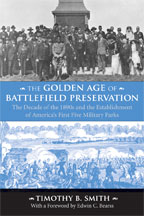The Golden Age of Battlefield Preservation
The Decade of the 1890's and the Establishment of America's First Five Military Parks

- Author(s): Smith, Timothy B.
- Series:
- Imprint: Univ Tennessee Press
- Publication Date: 2008-02-15
- Status: Active
- Available in Hardcover - Cloth: Price $38.95 | Buy Now
The 1890s, argues Timothy B. Smith in his new book, represented the climax of battlefield preservation in America. But what makes this decade so important? This decade was the perfect time for the establishment of these national parks. Five Civil War battlegrounds—at Gettysburg, Chickamauga and Chattanooga, Shiloh, Antietam, and Vicksburg—were commemorated as national sites during this time. Just past the bitterness and racial tensions of Reconstruction and prior to the explosive growth brought on by the Second Industrial Revolution, the time was right for the war’s veterans from both sides to come together, in a spirit of reconciliation and brotherhood, to lead the efforts to open the parks. As yet unmarred by development, these battlefield sites were preserved mostly intact, just how the veterans would have remembered them. To date, they represent the country’s finest preserved battlefields.
Smith’s book is the first to look at the process of battlefield reservation as a whole. He focuses on how each of these sites was established and the important individuals—the congressmen, the former soldiers, the veteran commissioners—who were the catalysts for the creation of these parks. The Golden Age of Battlefield Preservation is a watershed book about an essential period in the history of battlefield preservation and will be of interest to any reader who wishes to have a better understanding how such preservation efforts were initiated. Timothy B. Smith is the author of This Great Battlefield of Shiloh: History, Memory, and the Establishment of a Civil War National Military Park and The Untold Story of Shiloh: The Battle and the Battlefield. He is a former park ranger at the Shiloh National Military Park and now teaches at the University of Tennessee at Martin.
